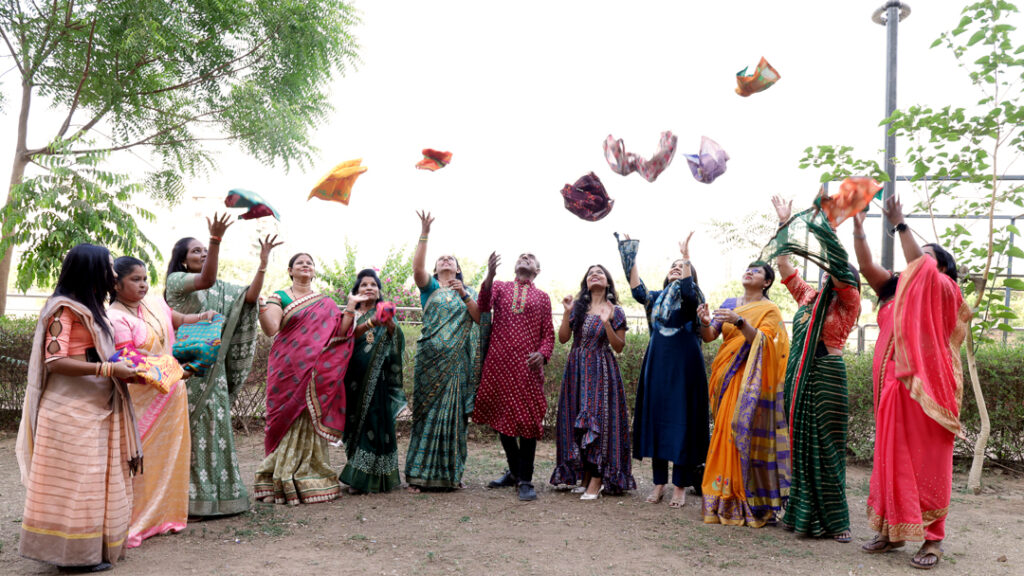
Helen Ting tells of a Nepalese orphan whose success in adversity has inspired a new organisation to support upliftment through craft.
A small textile business in Gujarat, India, supported by textile lovers from Australia, began with a COVID tragedy. Today, Indivaan with support from Sisters of India, employs 11 women and business continues to grow.
At the end of 2019, in the pre-COVID world, I went to India to discover the local textiles. In Gujarat, the birthplace of Gandhi, I met the contemporary faces of his idea of economic self-sustainability from artisanship. I found them in villages, cities, homes, workshops and academia. It showed me how interconnected our worlds are, not only through trade but shared values.
Returning to Australia and the pandemic, my fellow travellers and I received occasional news from one of our Gujarati guides. At first shocking and sad, the news grew more hopeful. And the network of supporters expanded.
Five years on, two start-up enterprises are open for business. This article is dedicated to their indomitable spirit in the hope that more sales will mean both Indivaan and Sisters of India can help the makers and businesswomen behind this work to continue to earn incomes with pride and honour.
According to research published in the Lancet magazine (2022): “The number of children affected by COVID-19-associated orphanhood and caregiver death is estimated … from April 30 to Oct 31, 2021… [at] 5,200,300.” The loss of parents and caregivers almost inevitably increases the risks of poverty and abuse.
This is the story of one of those orphans.
In 2020, at the height of the pandemic, the parents of a Nepalese girl died of COVID. Exploited by a relative, she was sold and shipped to Mumbai India, eventually arriving in Gujarat.
Livelihoods were suddenly suspended due to COVID. With no foreign tourists, our Gujarati tourist guide started designing and making bags, falling back on his background as a textile designer to earn a living. In Australia, some of my fellow travellers were buying bags or selling them at local markets to help. Facing his own tragedy of losing a parent to COVID, our guide resolved to help others who were also suffering.
After a chance meeting, he offered to help the orphaned girl return to Nepal. But with no family she could trust there, she preferred to stay in India.
The guide had work to do. Extricating her from her situation was dangerous but it was accomplished. Accommodation, a respectable job, paperwork to stay in India – all these needed solutions. The local police helped. So did an NGO. A sewing machine was bought. The girl began to help in the guide’s small textile business.
The next challenge was finding an ongoing livelihood for the girl. Thus, Indivaan, a new sustainable fashion label, was born.
Starting in early 2023, as business grew, other women joined. There are now 11 women earning regular incomes with Indivaan: ‘This gives them honour as business women, not just employees,’ says the guide who acts as their mentor.
Meanwhile, in Australia, another enterprise was born. After meeting the guide on a textile tour of Gujarat, a former Australian businesswoman, decided to help by creating Sisters of India. Sisters of India was established in Queensland to provide an Australian market for the products created by the Nepalese girl and the other women who joined the business. Like Indivaan, Sisters of India is a start-up business that empowers women.
Sisters of India has initiated new products for the Australian market, working with Indivaan. Through these women’s skills, and with the mentorship of the guide, sarees are finding a new life as shopping bags, gift wraps, scarfs and bottle bags. Strong and lightweight, recycled sarees are practical and attractive. The product range has gradually expanded with the support of other textile lovers. It now includes upcycled denim bags and clothing made from organic cloth, showing off the handcrafted block printing and natural dyeing that Gujarat has long been famous for.

You can find out more or purchase products: visit https://indivaan.com/ and www.sistersofindia.com.au, like www.facebook.com/sistersofIndia, follow sistersofindia and email Sharon Stevens sistersofindia@gmail.com
About Helen (SiuYi) Ting
Helen (SiuYi) Ting is an Australian-born Chinese textile lover. She travelled to Gujarat India in 2019 where she met the guide mentioned in this story. She now owns many recycled saree bags and wouldn’t leave home without one.

